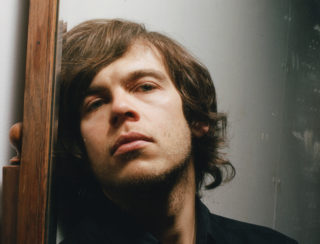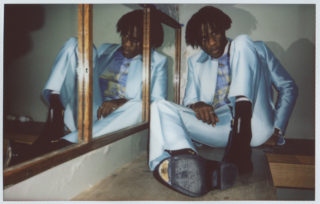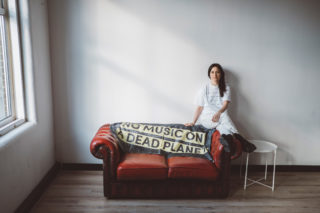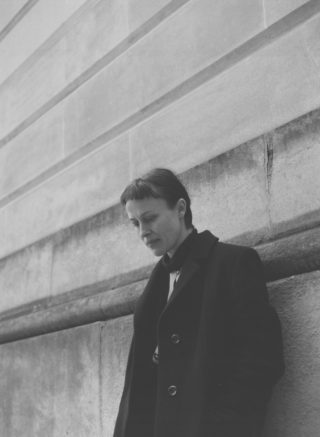
“I still don’t fucking fully know what I’m doing but I’m getting there,” says James Righton, hunched over a rickety pub table on a sweltering-hot day in East London. It’s a stark and rather unexpected admission from a musician with more than a decade of experience at the coalface in a famous band. Yet, throughout our time together I’ll learn that Righton is full of self-doubt.
Ensconced in new rave standard-bearers Klaxons for more than a decade, the 32 year-old found himself at a loss when the band effectively folded at the beginning of last year. Coupled with facing up to the prospect of fatherhood and the perennial success of his Hollywood leading lady wife (he and Keira Knightley married in 2013 and had a daughter, Edie, last year), perhaps Righton’s personal and professional uncertainty should actually come as no surprise. Certainly the name of his new project makes a lot of sense in this light.
‘Open up the Sky’ is the first EP from Shock Machine, with an album to follow. Recorded in a cabin in the South of France last year with long-time Klaxons producer James Ford, the release charts Righton’s contemplation of his new place in the world – and where he might be headed next. Songs like ‘Confusion’ and the title track move Righton well away from the eighties-influenced dance-punk of Klaxons and instead further towards seventies-style art rock and psychedelia; Pink Floyd through the prism of Tame Impala.
Even the Shock Machine moniker is a nod to Canterbury scene legends Soft Machine – about as esoteric as it gets. “I was just trying to get as far away as I could from the three-minute, four chord thing,” Righton says. “Even though I’ll always love that. I couldn’t sit down and write ‘Golden Skans’ again, though.”
“I fell into Klaxons by mistake”
I moved to London to start another band, that wasn’t happening, then I met Jamie through Simon who I went to school with, and then it took off. I just thought it was a big joke. It was funny because we played our first gig and I was gutted afterwards because we were terrible. We tried to play five songs I think and it was just a wall of noise and glow sticks and neon, whistles. Very bizarre. But we did this gig and then suddenly we got booked to do another show and there was a lot of interest and we were getting management but we’d hardly written a song together. Growing up outside of London and being in bands since I was a kid, I was always told and thought that being professional and good was the key to getting record deals and being able to do it for a career. Yet with Klaxons it was just the total opposite that generated such a buzz. We were just on this crazy curve where it just went straight up, then a slow decline.
“I was on a 10-year gap year”
I think Klaxons had a very strange lifespan and existence as a band that was quite unique really but we had an amazing time, an insane ride and we ticked boxes. I look back now and I think, God, we did so much… playing with Rihanna at the Brits, just bonkers stuff, meeting my heroes and idols. If someone had said, ‘You’re going to work with [one half of the Chemical Brothers] Tom Rowlands’, a hero since when I was 15, I mean, what, are you kidding? Then you meet [Bowie producer] Tony Visconti, you know. I think as a band we got to do some insane things and we did it right, that’s what I love about it. I was like 21, 22 when it started and I was on a 10-year gap-year.
“We got absolutely out of our minds”
Honestly, I’ve forgotten some of the bonkers stuff we did. In Egypt in the White Desert [for the video to ‘Echoes’], we got a white grand piano shipped over and set fire to it. The day of the shoot, the Egyptian government said we weren’t allowed to shoot so they had to get paid off. I mean, we were only a band but we were a pretty weird band, who got up to some pretty weird stuff. We blew literally hundreds of thousands on albums that never even got made, we won the Mercury prize – I forgot we even did that the other day – we got absolutely out of our minds. It’s weird now because in music it’s a lot easier to have a laptop and do everything yourself, you don’t need a band, but we were just like pirates, looting and causing mayhem wherever we went.
“I hated the idea of new rave”
The other guys wouldn’t mind me saying I hated the idea of new rave. I would do interviews where I would be like, ‘I resent this.’ I could see from that point on we were doomed. You can look at it one way and say, okay, it’s something that’s lazy and ‘tag-able’ and it’s a movement people can get behind of sorts, but it’s a weird one because there wasn’t any sort of sound. It wasn’t like punk or something where there’s a sound, this was based on an ethos and a random collection of… I don’t even know. It got people really excited and it gave us this push over and into the mainstream, but you knew at the time it was the death knell as well because you can’t ever live up to the level of expectation – you can’t grow in a kind more natural way, you can’t explore… you have to sell records.
“We’d said everything we could have said”
I don’t know if there was a definitive moment but there was a slow building feeling inside that maybe [Klaxons] were done. I can’t speak for the others – but I felt that we’d said everything we could have said within the collective unit that we were. I’m really proud of all three records and the EP that we made but I just didn’t know how we could exist anymore at the end of it. It just felt like it was so much effort to make records and in the end I don’t know what we were aiming for. It was this weird thing where we were a big band in a lot of people’s minds – a lot of people knew us – but I just remember that people would be like, ‘Oh yeah Klaxons, whatever happened to you guys,’ you know what I mean? We had two more records, we were touring but it was, ‘Oh yeah 2007, ‘Myths of the Near Future’, yeah.’ I think there’s only so much of that you can listen to before you think, oh man, I’m not sure I can do this anymore.
“I’m still in touch with the guys”
I love the guys but, you know, it’s really hard being in a band a long time. You grow as people, you change; you’re not the same people you were when you were 21. Your interests change; you might not be into the same things you were when you were 21, too. I ran into Jamie yesterday in Dalston, and Simon a couple of days ago – he’s back from New York. We live in the same areas. After spending 10 years together, lots of our friends are similar; we have a group of people who are our gang, because we grew up together. We hung out together and spent almost every day together for 10 years. Our circle became quite large, so you can’t just not bump into each other. It’s lovely, actually; I really love it.
“What am I doing with my life?”
After Klaxons finished, I faced that existential question we all go through: what am I doing with my life? It ended – the band – and that was like a full stop. That’s a juncture and then I’m at a point where I’ve got to decide what I’m going to do with my life. It was a point when I was just questioning whether I want to continue and try again. You invest a lot in something like an album. If you make that choice, like, I’m going to continue with this, it could be a couple of years out of your life. It’s a choice that you don’t take lightly, really.
“I was considering other things”
It was like [after Klaxons ended], what else do I do now? I’m 32, I’ve only ever had a job being in a band or working in a bar before, so… you’re fucked! Unless you want to get into management and the label side of it, or unless you’re one in 20,000 and you get a job on 6Music, then you kind of are fucked. A lot of people get into wine, or food, and it seems like it’s a transferable skill to get into that, or cheese, or like a craft ale company. A lot of it’s to do with making something and also labels, and producers and years, and it sort of taps into that geeky record collector thing. It’s funny where you end up in life – I’d love to find some stats on what happens to people at the end of bands.
“I had a reason for Shock Machine to exist”
I went into my little home studio – a little room full of synths and guitars and stuff – and I just kind of switched off that part of my brain that was caring and just started to make music that I liked. It came really quickly, basically, because I had something to say – there was a feeling [of the shock of leaving Klaxons]. I had a reason for it to exist: I’m really scared, my career’s ending, oh my God what am I going to do with my life – it’s a real shock to the system, I’ve got a baby on the way… I don’t know, it was just something I had to put into music. With the new record, post-rationally, maybe I knew what I was doing but I didn’t do it totally consciously – it was almost like a mood I was trying to aim for.
“From the heart rather than the head”
I listened to a lot of music that I loved originally – the Beatles, Todd Rundgren, Carole King, Beach Boys… All my life I’ve been into really interesting sounds, warm chords and melodies. I mean, I love things like Abba, Steely Dan, ELO and that kind of stuff with something that moves your heart. It’s more from the heart rather than the head. It’s a warm, fuzzy feeling you get with those L.A., West Coast records. I just got into breaking down how some of the music in ‘Pet Sounds’ was made, just sitting at home at my piano and figuring it out, how a lot of the music is in 7th chords and things like that where naturally they do kind of sound more upbeat.
“Recording the EP was a ball-ache”
When we went to check out the cabin in the South of France where we recorded – because James Ford was making the Foals record around the corner – we had gone there and it was like spring time and it was freezing so we thought it could be pretty cool. We didn’t think of the heat and that we’d be making it in July in the South of France. So that was one thing – the fact that the heat was blowing out the monitors, and I only had two. But also I’d forgotten about the cicadas. You know, they rub their legs together and make that ‘Tsch tsch tsch’ sound you get in hot countries? We were in this wooded area and I was worrying – I didn’t tell the guys – but I was worried there’d be this cicada hum over all of the recordings, the drums, everything that was close miked. It was a ball-ache and if I had to make another one now I’d probably just go to a fancy-pants studio.
“I’ve proved to myself that I can do it”
My dream when I was a kid was just to go to a record store and see my record there. Not that I didn’t with the Klaxons, because it was there and you could buy our record, but it was a shared thing. This record, it’s very personal and I put a lot into this. I think maybe because I never thought it would happen, because I didn’t really believe I could do it – I really didn’t think I would be able to make something that I’d be proud of and I’d want people to hear. I guess probably I also had a lot of insecurities about whether I was good enough. I’d never really written lyrics, I’d written them as a kid but I hadn’t done it for years and I didn’t really do it in the Klaxons; we all had roles we fit into. I feel more confident now.
“Being a musician isn’t a right”
I’m really lucky to be doing the thing that is my vocation. It is fucking hard to stay in it and make it work as a career; it’s really difficult. It’s weird because I’m 11 years in but I still feel weird when I write ‘musician’ on my visa. I’ll always feel like I’m totally blagging it. It was a big deal for me when I did a record deal around this record – it was still a huge thing for me. There is a small fire within me to try and… you know, a lot of people don’t really know what I do, [for them] I was just in ‘that band’ ten years ago and that was it.
“I’d go and see Shock Machine over James Righton at a festival”
There was definitely a feeling in me where I wanted [the project] to be judged for what it is. I don’t want any of the baggage. The name was a little nod to the Soft Machine and stuff too. I didn’t think there was any point in calling it my own name – I didn’t think there was any magic in that. I think Damon Albarn’s done it pretty well – he did Blur, Gorillaz, the Good, the Bad and the Queen – and it’s only now, aged 45 or whatever that he’s just Damon Albarn. There might be a James Righton record one day when I feel more comfortable with the skin that I’m in but I like the idea of a ‘band’ identity. Plus I just thought it looked good!
“My private life is sacred to me”
None of that would ever enter into any of my music or writing, ever. It’s just this weird thing, you can’t control press attention. Myself and my family, we just ignore it all. I mean, I just sit at home and play with my daughter. I don’t really let it bother me; I don’t let it enter into my world at all. My private life is sacred to me and I’m not that easy talking about it either. It’s this thing that I protect, and my music is this other thing. I don’t want anything to get in its way. At the end of the day I’m just a dad who’s very happy in his family life and who has a job – it’s a very weird job, not like a normal one – but then I’ve never known any different. It’s normal to me now.
“All of the celebrity stuff means nothing”
All the [celebrity husband] shit is way more normal than any of the shit that the Klaxons got up to. I’m not joking. I mean, yeah [after appearing alongside my wife at the Oscars last year] I got a few weird texts saying, ‘What the fuck?’ and all that. I didn’t know I was going to be sat next to Steve Carell, but you know, my wife had worked with him before so I’d met him. All of that stuff means nothing, though. I mean, firstly I’m just being a supportive husband who supports what his wife does. But honestly, that’s way more normal and sedate than anything we got up to as Klaxons.
“I feel like I’ve already had success”
I’ve had lovely e-mails out of the blue from people I haven’t spoken to in about ten years, or people we worked with when Klaxons started who I haven’t seen in ages, mainly musicians and directors, and they’ve just said they’re really into [the new record]. They didn’t have to do that and for me, if the people I really love and respect are into it, that makes me incredibly happy. I’m not trying to make music intentionally for anyone else but I remember thinking if my friends are into it then I’ll be really happy. So, I don’t know what that means about the amount of people – probably like me and four people at the pub – but yeah. I’d love it if it did really well but as long as I can sustain being a musician and making music I’ll be happy. As long as I can afford to pay my piano teacher to teach me jazz chords I’ll be happy enough.






